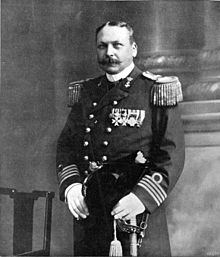Jean Jacques Rambonnet
Jean Jacques Rambonnet | |
|---|---|
 | |
| Born | 8 March 1864 Wijhe, Netherlands |
| Died | 3 August 1943 (aged 79) Rotterdam, Netherlands |
| Service | Royal Netherlands Navy |
| Years of service | 1883 - 1911 |
| Rank | Vice Admiral (titular) |
| Awards | Silver Wolf Award, Knight of the Order of the Netherlands Lion (1924), Commander in the Order of Orange-Nassau, with swords (1934), Knight 4th Class of the Militaire Willems Order (1905) |
| Other work | Chief Scout, Minister of Navy, Colonies, War, Member Dutch Council of State |
Jean Jacques Rambonnet (8 March 1864, Wijhe – 3 August 1943, Rotterdam) was a Dutch naval officer, politician and the only Chief Scout of the Netherlands.[1]
Career
You can help expand this article with text translated from the corresponding article in Dutch. (July 2009) Click [show] for important translation instructions.
|
Scouting

The Scouting career of Rambonnet started in 1920, that year he succeeded Prince Hendrik as head of the Boy Scouts in the Netherlands and was appointed chairman of the association "De Nederlandsche Padvinders" (NPV, The Dutch Pathfinders). When Scouting in the Netherlands started to follow more "English" rules, Rambonnet became in 1928 the first (and last) chief Scout of the Boy Scouts in the Netherlands. He held this position until just after the 5th World Scout Jamboree.
The "Rambonnethuis", a model for an ideal group home, that stood from 28 August 1948 to 19 March 1993 at the national Scouting campsite Gilwell Ada's Hoeve in Ommen, was named after Rambonnet. There are also several Scout Groups after him.
See also
References
- ^ Wilson p. 33 67
External links
- [1] Some pictures of and about Jean Jacques Rambonnet on the site "Het geheugen van Nederland"
- 1864 births
- 1943 deaths
- People from Wijhe
- Royal Netherlands Navy admirals
- Royal Netherlands Navy officers
- Independent politicians in the Netherlands
- Ministers of Colonial Affairs of the Netherlands
- Ministers of State (Netherlands)
- Scouting and Guiding in the Netherlands
- Commanders of the Order of Orange-Nassau
- Knights of the Order of the Netherlands Lion
- Knights Fourth Class of the Military William Order
- Recipients of the Silver Wolf Award
- Dutch politician stubs

